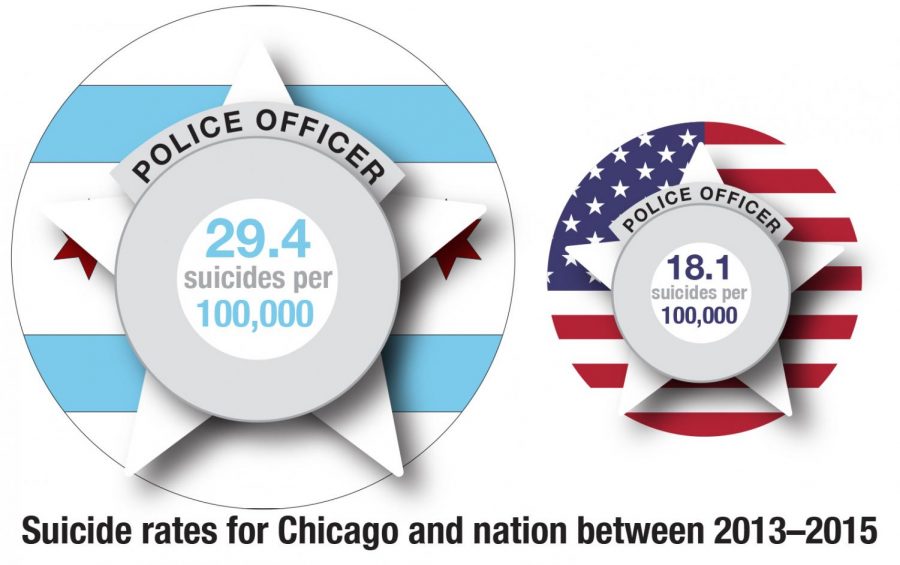CPD video series sheds light on police suicide
CPD video series sheds light on police suicide
October 9, 2017
In honor of Suicide Awareness Month, the Chicago Police Department—which has the nation’s highest suicide rates—released a video on its Facebook page Sept. 29 showing the on-the-job pressures police officers face.
The “You Are Not Alone” video highlights an officer struggling with the stress of civil lawsuits, police-involved shootings and his personal life.
Officer Michael Carroll in the CPD News Affairs Office said the goal is to increase officer awareness of mental health resources.
“Every officer is different [and] has their own reasons for why they may not seek help, so this is just to push the officers and [let them know] there is help,” Carroll said. “The last thing we want [is for] officers to take their own life.”
The U.S. Department of Justice report on CPD released in January 2017 revealed almost 30 suicides per 100,000 department members, 60 percent higher than the national average.
Retired Chicago Police Officer Ron Rufo worked for CPD’s Employee Assistance Program for more than 13 years and was a peer counselor on call to sites where officers were injured, killed or attempted suicide. While working for CPD, he wrote a book titled “Police Suicide: Is Police Culture Killing Our Officers?”
“[Suicide] is like that elephant in the room: Everybody knows it’s there, but nobody wants to talk about it,” Rufo said. “In my research, I’ve noted that, probably for the last 40 years, we’ve averaged about six officers a year [who have killed themselves].”
Psychologist and former Chicago Police Officer Carrie Steiner said the suicide rates are related to the amount of violence and gangs in Chicago. Steiner knew 15 officers who died by suicide during her 13 years in the department, which prompted her to start the First Responders Wellness Center.
Steiner now counsels approximately 120 first responders.
According to the DOJ report, CPD has three staff clinicians to serve the department’s approximately 13,500 personnel, with the DOJ recommending an increase. This does not include family members or retired officers who are also entitled to the counseling services.
CPD News Affairs did not respond for requests on the number of current staffed clinicians as of press time.
Although counseling is confidential, Rufo said there is still a stigma deterring officers from seeking clinical help.
“If an [officer] asks for help—and they rarely do—they may be deemed as weak,” Rufo said. “[Officers] are going to die a hero in the line of duty, but if they kill themselves or put a gun to their head, they are a coward because they couldn’t handle it.”
Illinois is also one of a handful of states that permanently prohibits anyone who has been involuntarily committed to in-patient mental health treatment from getting a Firearm Owner’s Identification Card. A permit to carry a gun is a job requirement for police officers, and many officers believe they could lose their FOID card if they seek help, Rufo said.
Steiner said there are many stress factors for officers, including the political climate, body cameras, negative media coverage and constant scrutiny of police.
“You feel, as an officer, there’s no right way, no matter what you do,” she said. “When you feel like that, that’s hopelessness, and hopelessness leads to suicide.”
Chicago Police officers are given at least one wellness class during academy training, according to CPD news affairs. But before starting the job, officers might not be aware of the mental and emotional struggles they will face, Steiner said. Steiner provides annual officer wellness mental-health checkups at her clinic.
“[Officer wellness training] needs to be ongoing,” Steiner said, “just like ongoing shooting training because it’s not until you see a dead body or a child being molested that you really know how you are going to react or respond.”
In addition, Steiner said officers should be counseled by individuals who understand police culture, noting that officers who see traumatic events have difficulty adjusting to everyday life.
“I saw a whole family run over by a car that was speeding away that was stolen. Right after that, I had to go to a parking violation,” Steiner said. “How do I go from a family being run over and a 4-year-old being killed to a parking violation complaint? How do you have the same type of understanding? The thing is police officers are humans, too.”








